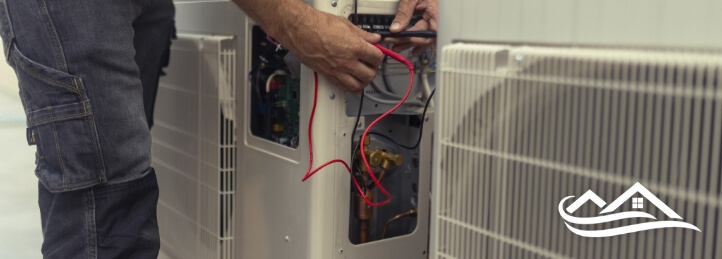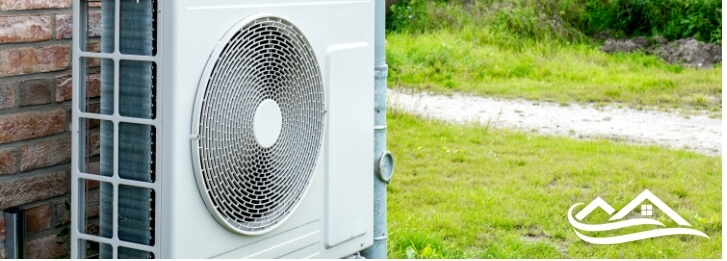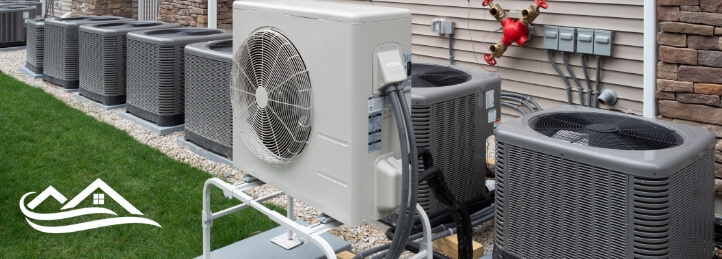Heat Pumps

One of the best comfort systems for the Florida climate is a heat pump, a device that works as both an air conditioner and an energy-efficient heating system, taking care of a home’s year-round comfort needs. We provide full service for the best heat pump models on the market including ductless systems that will fit any home and push energy efficiency even higher. Ask our technicians today about the possibility of changing to a heat pump.
- Family owned since 1989
- NATE and EPA-certified technicians trained on all makes and models
- Customer service center to handle around-the-clock emergencies
Comfort Zone A/C & Heating is the leading provider of comprehensive air conditioning, heating, and indoor air quality services on the Treasure Coast. With nearly forty years of providing superior customer service to our loyal customers, we have remained Central Florida’s most trusted HVAC contractor by providing a superior level of professionalism and customer service in every job we perform.
Call the most trusted name in Central Florida: Let Us Make Your Home Your Comfort Zone!
Introduction to Heat Pumps
Heat pumps are an energy-efficient alternative to traditional heating and cooling systems, offering a versatile solution for maintaining comfortable indoor temperatures year-round. Unlike systems that generate heat by burning fuel, heat pumps work by transferring heat from one location to another. This process makes them a cost-effective and environmentally friendly option for homeowners.
Powered by electricity, heat pumps significantly reduce reliance on fossil fuels, thereby lowering your carbon footprint. They are particularly beneficial in various climates, including colder regions where traditional heating systems may struggle to provide efficient heating. Heating with heat pumps produces 45 to 70 percent fewer carbon emissions than gas-fired furnaces, making them an environmentally friendly choice. By understanding how heat pumps work and their numerous benefits, you can make an informed decision about whether a heat pump system is the right choice for your home.
Efficient Heat Pump Services for Year-Round Comfort
Florida’s climate makes a heat pump an excellent choice, thanks to its ability to switch between heating and cooling with ease. Selecting a heat pump with the appropriate cooling capacity to meet specific residential needs is crucial for optimal performance and comfort. Our team specializes in heat pump installations, ensuring that every system is optimized for energy efficiency and tailored to your home’s needs. From the initial consultation to system installation, we prioritize precision and quality to maximize performance and reduce energy costs, keeping you comfortable year-round. If you’re upgrading your system, learn more about our heating installation and replacement services to ensure a perfect fit for your home.
We understand the challenges and nuances involved in selecting and installing a new HVAC system, particularly focusing on modern heat pumps.
Electric heat pumps are efficient and environmentally friendly alternatives to traditional systems.
In addition to installations, we offer comprehensive maintenance and repair services designed to keep your heat pump running efficiently. Regular service helps catch potential issues early and extends the lifespan of your system, which is especially beneficial given Florida’s intense summer heat and unpredictable winter chills. Our NATE and EPA-certified technicians are trained on every make and model of heat pump, ensuring that we can meet your specific requirements. With our heat pump services, you can enjoy peace of mind knowing your home’s comfort is in capable hands.
Benefits of Choosing a Heat Pump for Heating & Cooling
Heat pumps are a popular choice for Florida homeowners due to their versatility and efficiency. Unlike traditional HVAC systems that rely on separate units for heating and cooling, a heat pump offers both functions in a single, efficient system. This makes it ideal for Florida’s mild winters and hot, humid summers. By choosing a heat pump, you can lower your energy costs and reduce your environmental footprint, as these systems are designed to use less energy compared to conventional systems. The heating seasonal performance factor (HSPF) is a crucial measurement for evaluating a heat pump’s performance in heating mode, with higher ratings indicating greater efficiency and potential cost savings over time.
In addition to energy savings, heat pumps offer consistent comfort and temperature control. Conducting a Manual J load calculation is the essential first step in selecting the right heat pump for your home, as it helps determine the appropriate heating and cooling needs. This industry-standard calculation ensures that your system is neither over- nor undersized, optimizing both performance and efficiency. Modern heat pumps come with advanced features that allow you to fine-tune your indoor climate with ease. Heat pumps effectively provide heating by absorbing heat from the air and transferring it indoors. Whether you’re looking to upgrade an old system or install a new one, our team will help you select a heat pump that aligns with your home’s unique needs. Trust us to guide you through the process and enjoy a reliable, efficient heating and cooling solution.

Types of Heat Pumps
There are several types of heat pumps available, each with its own set of advantages. The most common type is the air-source heat pump, which transfers heat between the outdoor air and the indoor air. These systems are highly efficient and suitable for a wide range of climates. Proper installation and assessment techniques for a whole house heat pump are crucial, including load calculations, ductwork suitability, and air leakage tests to ensure optimal performance.
Ground-source heat pumps, also known as geothermal heat pumps, transfer heat between the ground and the indoor air. These systems are incredibly efficient and reliable, providing a consistent source of heat regardless of outdoor temperatures. The ground loop in geothermal heat pumps plays a vital role in achieving high efficiency by transferring heat between a home and the ground. High-efficiency geothermal heat pumps use 61% less energy than standard models, leading to significant cost savings over time. They are an excellent choice for homeowners looking for a long-term, sustainable heating solution.
Hybrid systems combine a heat pump with a traditional heating system, such as a gas furnace. This setup provides a backup source of heat during extremely cold temperatures, ensuring your home remains comfortable even in the harshest conditions. Each type of heat pump has its unique benefits, and the right choice will depend on factors such as your local climate, home size, and budget.
How Heat Pumps Work
Heat pumps operate by using a refrigerant to transfer heat from one location to another, detailing the mechanics behind transferring heat between different environments, rather than generating heat from fuel. In heating mode, the heat pump absorbs heat energy from the outdoor air or ground and transfers it to the indoor air, providing a warm and comfortable environment. A heat pump absorbs heat energy from the outside air and circulates it to provide heating indoors. Conversely, in cooling mode, the heat pump absorbs heat from the indoor air and releases it outside, keeping your home cool and comfortable.
This ability to provide both heating and cooling makes heat pumps a versatile solution for homes in various climates. By transferring heat instead of generating it, heat pumps offer significant energy savings and help reduce energy costs, making them an attractive option for energy-conscious homeowners.
Components of a Heat Pump System
A typical heat pump system consists of several key components that work together to transfer heat efficiently. The outdoor unit contains a coil and a fan, which collaborate to transfer heat from the outdoor air to the refrigerant. The indoor unit also has a coil and a fan, which transfer heat from the refrigerant to the indoor air. In cooling mode, the condenser coils play a crucial role in the heat transfer process by allowing the hot, pressurized refrigerant to release its heat to the outside air, causing it to condense back into liquid form as it cools.
Unlike traditional furnaces, heat pumps do not create heat by burning fuels. Instead, they redistribute heat from the environment, making them more efficient and environmentally friendly.
The refrigerant is the crucial element that allows the heat pump to transfer heat from one location to another. Other essential components include the compressor, which circulates the refrigerant, the expansion valve, which regulates the refrigerant flow, and the reversing valve, which switches the system between heating and cooling modes. When the outdoor temperature drops below the heat pump’s efficiency threshold, backup heating systems can be activated to maintain comfort. Together, these components ensure the heat pump operates efficiently and effectively.
Heat Pump Installation and Repair
Proper installation of a heat pump system is crucial for its efficiency and performance. A qualified HVAC contractor should be hired to install the heat pump system, ensuring that it is done correctly and safely. The installation process involves connecting the outdoor unit to the indoor unit, installing the refrigerant lines, and configuring the system’s settings. This meticulous process ensures that the heat pump operates at its optimal capacity, providing efficient heating and cooling for your home.
Regular maintenance and repair are essential to extend the lifespan of the heat pump system and prevent costly repairs. A well-maintained heat pump system can provide efficient heating and cooling, reducing energy costs and minimizing its carbon footprint. By scheduling regular check-ups and addressing any issues promptly, you can ensure that your heat pump continues to operate smoothly and efficiently, keeping your home comfortable year-round.
Is a Heat Pump a Good Option for My Home?
Heat pumps are an excellent choice for Florida homes due to the state’s moderate winter temperatures. Modern heat pumps are also designed to function efficiently in colder climates, making them suitable even for regions that experience frigid temperatures. Unlike colder regions, Florida rarely experiences freezing temperatures, making a heat pump a reliable and efficient option for year-round comfort. If you’re looking for a system that provides both heating and cooling, a heat pump offers a practical and energy-efficient solution. Our team can evaluate your home’s specific needs, insulation, and square footage to help you decide if a heat pump is the best choice. Homes without ducts can also benefit from ductless systems, which offer flexible, energy-saving options for zoned comfort.
Cold climate heat pumps are particularly efficient and suitable for homes located in regions with harsh winter conditions.
We understand that every home is unique, and we’re here to guide you in making an informed decision. With our expertise, you’ll have a clear understanding of the advantages a heat pump can bring to your home. Whether you’re building a new home or upgrading your current HVAC system, we’ll ensure that your heat pump selection aligns with your comfort goals and budget. Let us help you enjoy a comfortable, energy-efficient home in any season.
What Are the Signs My Heat Pump Needs Repair or Replacement?
Keeping your heat pump in top condition is essential to avoid unexpected breakdowns, especially during Florida’s hot summer months. If you notice unusual noises, such as grinding or rattling, it’s a sign that your heat pump might need repair. The outdoor compressor plays a crucial role in transferring heat between indoor and outdoor units, and its efficiency can significantly impact the overall performance of your system. Other warning signs include reduced airflow, inconsistent temperatures, and a sudden increase in energy bills. When these issues arise, scheduling heat pump repair with us as soon as possible can prevent further damage and restore your system’s efficiency.
Choosing qualified HVAC contractors for installing and maintaining heat pumps is crucial to ensure optimal performance and longevity.
In some cases, replacement may be a more cost-effective option, especially if your heat pump is more than 10 to 15 years old. Advances in heat pump technology mean that newer models offer greater efficiency and comfort than older units. Our team will assess your system’s condition and recommend the best course of action, whether it’s repair or replacement. A new heat pump can serve as both a heating and cooling solution, often providing better efficiency and cost savings over traditional systems, especially when replacing an aging air conditioner. With our expert services, you can be confident that your heat pump will continue to keep your home comfortable without unnecessary interruptions.

How Often Should a Heat Pump Be Serviced?
To keep your heat pump operating efficiently, regular service is essential. The indoor coil plays a dual role as both an evaporator coil in cooling mode and a condenser coil in heating mode. In Florida, where heat pumps work year-round to maintain comfortable indoor temperatures, we recommend scheduling a maintenance visit twice a year. During these visits, our technicians will clean coils, check refrigerant levels, inspect the compressor, and test system performance to ensure your heat pump is functioning at peak efficiency. For added peace of mind and peak seasonal performance, consider our heating repair and maintenance services to keep your system reliable all year long. Proper air sealing, along with good insulation, helps prevent energy loss, ensuring that heat pumps operate effectively by maintaining a consistent indoor temperature and reducing drafts. Regular maintenance not only prevents costly repairs but also extends the life of your system.
Seasonal tune-ups are particularly important as they prepare your heat pump for Florida’s summer heat and occasional winter chill. By maintaining your system’s components, you’ll enjoy consistent performance and lower energy bills throughout the year. Annual maintenance should include cleaning coils and checking system charges for optimal heat pump performance. Heat pumps can struggle to perform efficiently as outdoor temperatures drop, so users in colder regions may need supplemental heating solutions. With our comprehensive heat pump services, you can feel confident knowing that your system is well-prepared to handle the demands of the climate in Vero Beach, FL and on the Treasure Coast of Florida. Trust our team to keep your heat pump running smoothly and your home comfortable year-round.
Maintenance and Upkeep
Regular maintenance is vital to ensure the heat pump system operates efficiently and effectively. One of the simplest yet most important tasks is to clean or replace the air filters regularly. Clean filters maintain good airflow and prevent damage to the system, ensuring that your heat pump runs smoothly.
The outdoor unit should be kept clear of debris, and the coil should be cleaned periodically to ensure proper heat transfer. This helps the system to absorb and release heat efficiently, maintaining optimal performance. Additionally, the refrigerant levels should be checked regularly, and any leaks should be repaired promptly to prevent damage to the system.
Scheduling annual maintenance with a qualified HVAC contractor can help identify potential issues before they become major problems. Regular professional check-ups ensure that all components of the heat pump system are in good working order, extending the lifespan of the system and maintaining its efficiency.
Central Air Integration
Heat pumps can be seamlessly integrated with a ducted system, operating similarly to a central air conditioning system, providing a comprehensive heating and cooling solution for your home. By utilizing the existing ductwork, heat pumps offer a cost-effective and efficient way to upgrade your home’s HVAC system. This integration eliminates the need for separate heating and cooling systems, streamlining your home’s climate control.
Heat pumps extract heat from the outside air during both heating and cooling modes, even in cold conditions, by facilitating heat exchange between the outdoor unit and the refrigerant.
When integrating a heat pump with a central air system, it’s crucial to ensure that the ductwork is properly sealed and insulated. This maximizes efficiency and minimizes energy losses, ensuring that your system operates at peak performance. A professional HVAC contractor can help determine the best way to integrate a heat pump with your central air system, ensuring a seamless and efficient transition that keeps your home comfortable year-round.
Cooling Mode and Heat Pumps
In cooling mode, the heat pump system absorbs heat from the indoor air and transfers it to the outdoor air. This process involves the refrigerant absorbing heat from the indoor coil and releasing it through the outdoor coil. The fan blows air over the indoor coil, allowing the heat to be transferred to the refrigerant, which then carries the unwanted heat outside.
The heat pump system can provide efficient cooling, even in extreme temperatures, making it an ideal solution for warm climates. By using a heat pump system for cooling, homeowners can reduce their energy costs and reliance on traditional air conditioning systems. This not only saves money but also contributes to a lower carbon footprint, making heat pumps a smart choice for environmentally conscious homeowners.
Are Ductless Mini Splits Heat Pumps?
Yes, ductless mini splits use heat pump technology to deliver year-round heating and cooling. These systems are gaining popularity in Vero Beach, FL and on the Treasure Coast of Florida. Traditional HVAC systems require ductwork, which can be cumbersome to install and are prone to inefficiencies. Mini splits, however, operate without ducts, making them a perfect option for older homes, new additions, or areas that need targeted climate control, like home offices or sunrooms. With a mini split, you can enjoy reliable, quiet, and energy-saving comfort wherever you need it most. Air-to-air heat pumps collect heat from the outside air to deliver efficient heating and cooling.
One of the primary benefits of a mini split system is its flexibility. Each unit is independently controlled, allowing you to adjust the temperature in individual rooms or zones of your home. This zoned control feature means you only use energy where you need it, reducing your overall consumption and helping to lower utility bills. Imagine keeping your living room cool during a hot Florida afternoon without overcooling unused bedrooms. This level of control is simply not possible with a traditional, central HVAC system.
Another significant advantage of mini splits is their energy efficiency. Since these systems operate as heat pumps, they rely on advanced inverter technology to deliver precise temperature control. The inverter adjusts the system’s output to match the cooling or heating demand, rather than cycling on and off like a traditional air conditioner or furnace. This smooth, continuous operation conserves energy, reduces wear and tear on the system, and keeps indoor temperatures consistent. Plus, homeowners can benefit from this technology in both summer and winter, as mini splits can reverse their operation to heat your home during the chillier months.
In a mini split system, the air handler serves as the indoor unit that works alongside the outdoor unit. It houses the fan and coil necessary for heating and cooling, facilitating airflow throughout a home’s ductwork. In cooling mode, the system extracts heat from the indoor air and transfers it outside, delivering cool air through the home’s ductwork.
Mini Splits as Heat Pumps
As a type of heat pump, mini splits work by transferring heat instead of generating it. In cooling mode, they provide cooling by pulling heat out of your indoor air and releasing it outside. In heating mode, they absorb heat from the outdoor air and bring it indoors, even in cooler temperatures. This process is highly efficient, especially in a mild climate like Florida’s, where winter temperatures rarely drop too low.
Modern heat pumps can efficiently extract heat from outdoor cold air even in frigid temperatures, showcasing advancements in technology that allow them to function effectively in colder climates.
Because mini splits rely on a heat exchange process, they use less electricity than standard heating and cooling systems. This energy efficiency translates to cost savings for Florida homeowners, who can enjoy lower monthly bills and reduced environmental impact. And since mini splits use eco-friendly refrigerants, they also help minimize carbon emissions, making them an environmentally responsible choice for homeowners who want to reduce their footprint.
If you’re searching for a versatile and energy-efficient way to heat and cool your Florida home, mini splits could be the perfect solution. At Comfort Zone A/C & Heating, we specialize in the installation, repair, and maintenance of mini splits, helping you achieve comfortable temperatures in every corner of your home without sacrificing efficiency or driving up energy bills.
Finding a Qualified Installer
When selecting a heat pump installer, it’s essential to look for a qualified and experienced HVAC contractor. Check for certifications, such as NATE or EPA, and ensure the contractor has experience with heat pump installations. These certifications indicate that the contractor has the necessary knowledge and skills to install and maintain heat pump systems effectively.
Ask for references and reviews from previous customers to gauge the contractor’s reputation and quality of work. Ensure the contractor provides a comprehensive installation package, including sizing, configuration, and testing of the system. A qualified installer will ensure the heat pump system is installed correctly, providing efficient and reliable heating and cooling for years to come.
Conclusion
Heat pumps offer an energy-efficient and environmentally friendly solution for heating and cooling homes. By understanding the different types of heat pumps, their installation, and maintenance requirements, homeowners can make informed decisions about their heating and cooling needs. Proper installation, regular maintenance, and repair are crucial to ensure the heat pump system operates efficiently and effectively.
With the right heat pump system and a qualified installer, homeowners can enjoy reliable and efficient heating and cooling, reducing their energy costs and carbon footprint. As technology continues to evolve, heat pumps will become an increasingly popular choice for homeowners looking for a cost-effective and sustainable heating and cooling solution.

